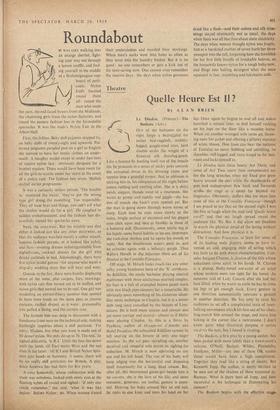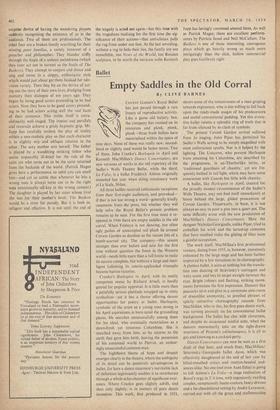Theatre
Queue Heure Est 11?
By ALAN BRIEN Our of the bedroom on the right limps a bedraggled (or rather bed-raggled), wobbly- legged, goggle-eyed man, bent double under the weight of a flowered silk dressing-gown. Like a boozed fly hauling itself out of the treacle tin, he proceeds in a series of sticky jerks towards the canopied. divan in his drawing room and topples into a grateful torpor. just as oblivion is (ticking him in, his companion of the night before conies rattling and rustling after. She is a shiny Swish, elegant, blonde wasp of a courtesan. She wants to gossip and cuddle and giggle—she has tins' of treacle she hasn't even opened yet. But the man is going down through warm waves. of sleep. Each time he rises more slowly to the noisy, bright surface of existence and his glazed eyes click open and shut as blankly as those. of a, battered doll. Occasionally, some tetchy tug at his lapels, some banal babble in his ear, interrupts the tockabye rhythm and he opens his mouth to reply. But the slumberous waters pour in, and he subsides again with a lethargic gargle. Thus Robert Hirsch in the hilarious third act of Le Dindon at the Comedie Francaise.
Off stage, M. Hirsch looks much like any other sulky young handsome hero of the 'X certificate. As Redillon, the randy bachelor playing musical mattresses with three adulterous married couples, his face is a ball of crumpled brown paper stuck with two black pipe-cleaners for a moustache. He obviously owes something of his elaborate silent- film mime technique to Chaplin, but it is a minor debt long since cancelled by the Statute of Limi- tations. He is both more sinister and sensual and yet more corrupt and mortal—almost as if Hitler were playing Chaplin. As this is a farce by Feydeau, author of Occupegoi d'Ainelie and Hotel Paradisa, the exhausted Rddillon 'cannot be left snoring on the bosom of only .one eager mistress. As the act goes spiralling on, another deceived and vengeful wife bursts in, sighing for seduction. M. Hirsch is now operating on one eye and his left hand. The rest of his body will keep edging into the horizontal and disposing itself luxuriously for a long, dead swoon. But, after all, this determined goose-girl beside him is no coc..otte, she is the love of his life, and some romantic, generous, yet restful, gesture is essen- tial. Heaving his body around like an old suit, he sinks to one knee and rests his head on her lap. Once again he begins to nod oti and wakes horrified a minute later, to find himself rocking on his hips on the floor like a 'wooden horse. When .yet another wronged wife turns up, throw- ing open her jacket and offering a pillowy expanse of white blouse, Don Juan can bear the tortures of Tantalus no more. Sobbing and snivelling, he shambles stiff-legged and rusty-kneed to his bed- room and locks himself in.
Le Dindon lasts three hours. Act Three, and some of Act Two, more than compensated me for the long stretches when my fixed grin grew heavy around the ears while the shuttlecocks of pun and malapropism flew back and forwards across the stage at a speed far beyond my linguistics. Obviously, duffers like me must lose most of this at the Comedic Franetrise--though I am proud to say that on the second night I was .the first to laugh when the man said 'Queue heure est-if?' and that my laugh spread round the
like 'flu. But it did allow me freedom to watch the physical detail of the acting without distraction. And how physical it is.
The Comedic Fran caise, at least for some of of its leading male players, seems to have in- vented an odd, engaging style of acting which has little to do with direct characterisation. Con- sider Jacques Charon, le dintion of the title whose seductions come apart in his hands. M. Charon is a plump, , fleshy-nosed ant-eater of an actor whose tendon's seem too tight for his bones. As someone said of Lady Cunard after she had her face lifted, when he wants to smile he has to cross his legs to get enough slack. Every gesture in one direction automatically operates a gesture in another direction. He has only to raise his eyebrows to set off a complicated train of inter- taking movements which lift him out of his chair, frog-march him around the stage, and leave him ticking in the corner like a metronome. I don't know quite what theatrical purpose it serves vis-a-vis the text, but I found it riveting.
The Buskers, a first play by a young author, h is been pasted with more labels than a travel-snob's suitcase. O'Neill, Beckett, Wilder, Pirandello, Faulkner, Miller—any one of these OK names `alone would have been a high compliment. Together they read like a string of insults. But Kenneth Jupp, the author, is surely entitled to be seen out of the shadow of these supposed in- fluences. What is there here of Jupp, and how successful is his technique in illuminating his content?
The Buskers begins with the effective stage- surprise device of having the wandering players suddenly recognising the existence of us in the audience. Two of them are professionals. The other four are a broken family searching for their missing pater familias, a saintly innocent of a preacher and philosopher. They blunder stiffly through the finale of a tedious melodrama (which they later act but in earnest as the finale of The Buskers). They attempt to conjure and dance and sing and mime in a sloppy, enthusiastic style which would just about get them booked for tele- vision variety. Then they hit on the device of act- ing out the story of their own lives, dredging from memory their dialogue of ten years ago. They began by being good actors pretending to be bad actors. Now they have to be good actors pretend- ing to be bad actors acting well the real facts of their existence. This treble bluff' is extra- ordinarily well staged. The ironies and parallels and reversals achieve a grisly hypnotic grip. Mr. Jupp has carefully written the play of reality within a non-realistic play so that each character is in slightly wry and oblique relation to the other. The sexy mother acts herself. The father is played by a wandering stinking tinker who seems impossibly ill-fitted for the role of the saint yet who turns out to be the saint returned from the backside of the world. (Patrick Magee gives here a performance so solid you can smell him—and yet so subtle that whenever he hits a wrong note it always turns out to be the right note intentionally off-key in the wrong context.) The daughter is played by her sister whose rival she was for their mother's lover. The Buskers would be a sitter for parody. But it is both in- telligent and effective. It is not until the end of the tragedy is acted out again—but this time with the tragedians realising for the first time the sig- nificance of their actions—that anti-climax Pulls the rug from under our feet. At the last unveiling, without a rag to hide their lies, the family are too monolithic, too News of the World, too Russian sculpture, to be worth the intricate webs Kenneth Jupp has lovingly cocooned around them. As well as Patrick Magee, there are excellent perform- ances by Patricia Jesse! and Neil McCallum. The Buskers is one of those interesting, courageous plays which go heavily wrong so much more intriguingly than the slick, hollow commercial play goes faultlessly right.



































 Previous page
Previous page